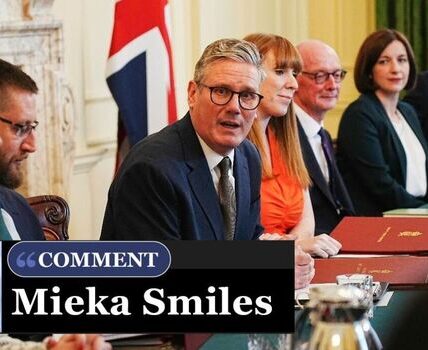
Britain could well be running back into the arms of the EU (Image: PA)
The alarm bells are blaring in the Labour-run Treasury as officials stare nervously at borrowing costs for 10-year bonds creeping up to 2008 levels, alongside the economy flatlining and the pound falling to its lowest level since 2023.
Shaken by the global markets, which have seemingly voted thumbs down on Labour’s budget, featuring increased borrowing and tax rises on businesses, ministers are scrambling to find somewhere, anywhere, for growth to avoid hiking further taxes or spending cuts.
Conditions may only get worse, with soon-to-be US President Trump in no mood to entertain Labour and quite prepared to heap trade tariffs on the UK, egged on by his pal Elon Musk, who is attacking Starmer almost daily on X.
So where might our embattled government go from here?
Unfortunately for committed Brexiteers, it might well be into the arms of the EU. This week, it was announced that former Brexit negotiator Oliver Robbins, who became somewhat of a bogeyman to Eurosceptics, is making a return to the Civil Service, straight into the gilded Foreign and Development Office as the new Permanent Secretary, its most senior civil servant.
Despite Robbins not having been a senior diplomat, it’s been clear for some time that Labour circles fancied him, having already been shortlisted for the even more senior role of Cabinet Secretary – plus his links as a partner at the advisory firm Hakluyt. Starmer had already poached Hakluyt’s then — managing partner Varun Chandra as his influential business and investment adviser.
Robbins start coincides with the Trump’s presidency. Given the likely expectation of a cooling US relationship, even with the help of their ultimate networker, the new UK Ambassador to the US, Lord Mandelson, there is little doubt that Robbins’ appeal to ministers lies in his experience as a former Brexit trade negotiator.
Keir Starmer, despite ruling out the return of the UK to the EU’s single market and customs union during last year’s general election (not that manifesto promises are quite as cast iron of late), has pledged to “reset” relationships — code for closer ties — with the EU.
Labour has already been advertising for a Sherpa, a senior role in leading talks on trade and security.
The big economic interest at stake is the UK-EU Trade and Cooperation Agreement (TCA), the free trade agreement negotiated under Boris Johnson to avoid a ‘no-deal Brexit’. Next year, the TCA is due for a scheduled ‘review’, and some Europhiles might be eyeing that up as a moment to reopen certain provisions and bring the UK back closer to Brussel’s economic orbit.
The wily EU isn’t that willing to fully reopen the TCA — without a hefty price. There has been for example, much talk of a youth mobility scheme. Starmer has insisted there are ‘no plans’ on this.
Cynics can imagine negotiators framing it quite easily as a time-limited visa scheme to nullify accusations of expanding free movement — although the potential increase in immigration may cause Starmer even more headaches.
However, having worked in the Brexit Department, I suspect the bigger prize for the EU is the UK’s Exclusive Economic Zone (EEZ), the sea area under the direct territorial ownership of the UK. The UK has the fifth-largest EEZ in the world, and other countries are desperate to seize the fish in our waters. Indeed, the EU lamented the UK’s departure in part because all EU Member States were obliged to share their EEZs.
Instead, our current post-Brexit trade deal boosts our overall fishing quota by 25% compared to the pre-Brexit arrangement as part of a transitionary period. From mid-2026, this will revert to regular negotiations on the Total Allowable Catch. The EU fears the UK could play hardball and favour, quite reasonably, our own fishing industry.
So, expect immense pressure from the EU to link UK EEZ access talks with trade to soften our position. The political instincts of this government lean towards their comfort zone of the EU. It was just over five years ago that Starmer wanted to rerun the Brexit referendum and then campaign to Remain.
Despite awkwardly flirting with China, it’s not hard to see a boxed in government, unable to find growth through their own budget, or through a trade deal with the US, view unlocking a closer economic bond with the EU as their pathway to growth. Olly Robbins, with his deep contact book and negotiation scars, would be the hire that could keep that door firmly open — but at what price to our hard-won sovereignty?


